Module 3 Life now and then Unit 1 They sometimes work harder 导学课件30张PPT
文档属性
| 名称 | Module 3 Life now and then Unit 1 They sometimes work harder 导学课件30张PPT |

|
|
| 格式 | zip | ||
| 文件大小 | 1003.0KB | ||
| 资源类型 | 教案 | ||
| 版本资源 | 外研版 | ||
| 科目 | 英语 | ||
| 更新时间 | 2018-12-29 21:22:48 | ||
图片预览

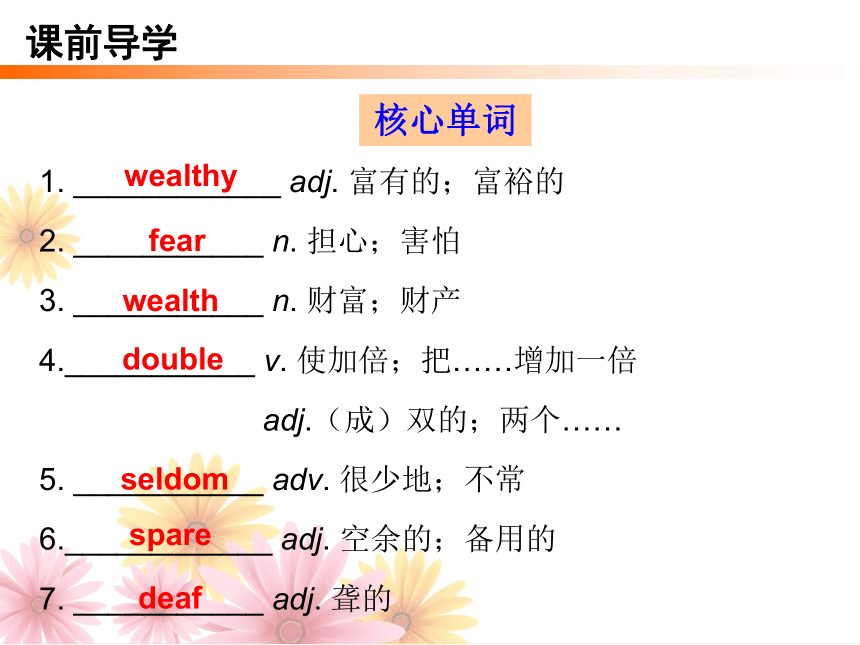

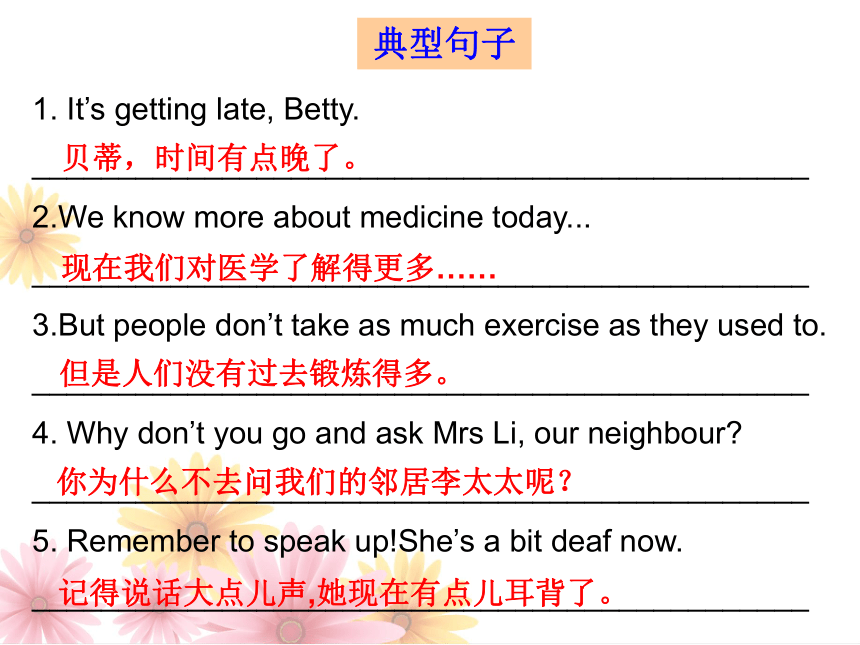

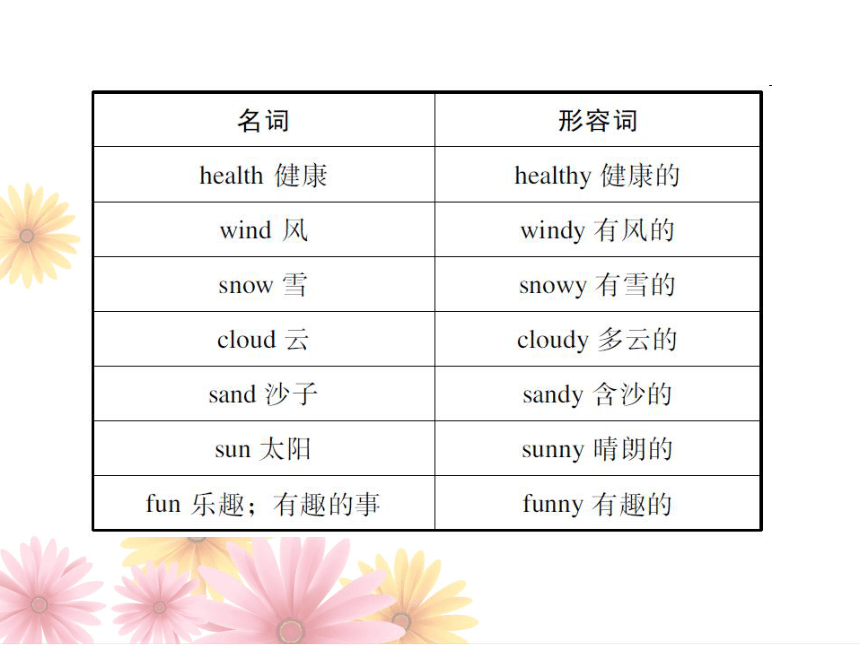




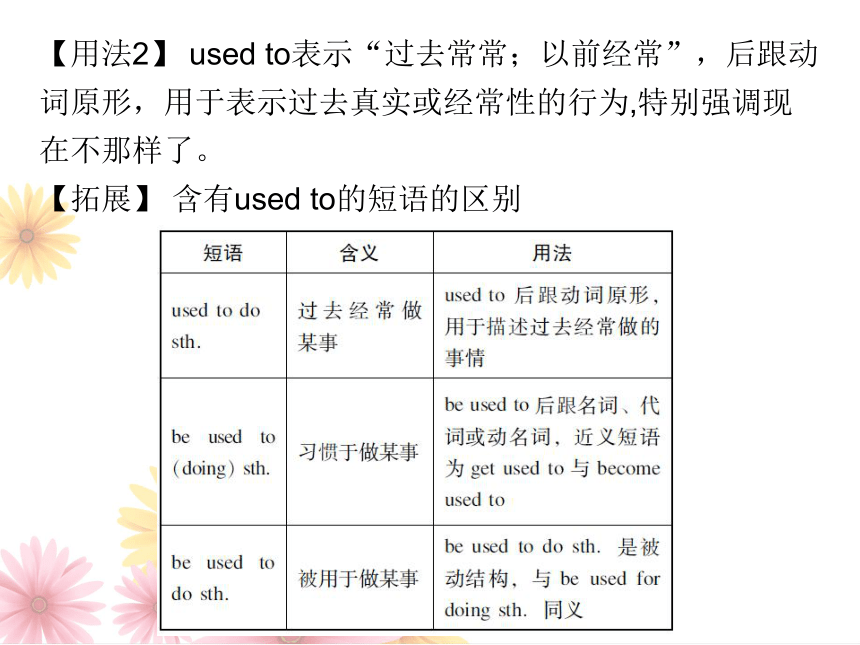
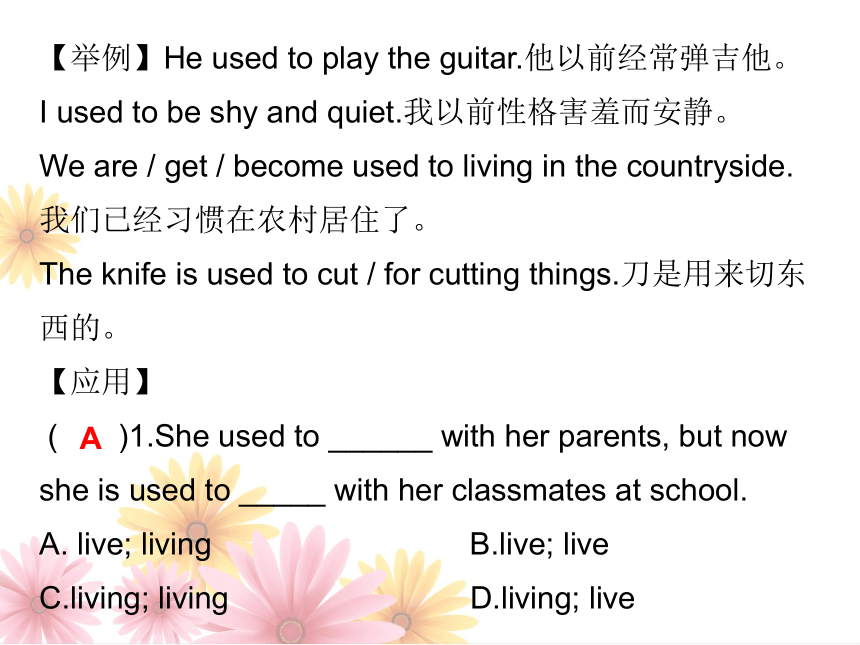
文档简介
Module 3 Life now and then
Unit 1 They sometimes work harder.
第一课时 Getting ready & vocabulary
课前导学
核心单词
1. ____________ adj. 富有的;富裕的
2. ___________ n. 担心;害怕
3. ___________ n. 财富;财产
4.___________ v. 使加倍;把……增加一倍
adj.(成)双的;两个……
5. ___________ adv. 很少地;不常
6.____________ adj. 空余的;备用的
7. ___________ adj. 聋的
wealthy
fear
wealth
double
seldom
spare
deaf
常考短语
1. ________________ 在过去
2. ________________ 当然
3. ________________ 应付;处理
4. ________________ 过去
5. _________________________ ……的数量
6. ________________ 业余时间;闲暇
7. _______________________ 记得要做……
8. ________________ 大点声说
in the past
of course
deal with
used to
the number of ...
spare time
remember to do
speak up
典型句子
1. It’s getting late, Betty.
_____________________________________________
2.We know more about medicine today...
_____________________________________________
3.But people don’t take as much exercise as they used to.
_____________________________________________
4. Why don’t you go and ask Mrs Li, our neighbour?
_____________________________________________
5. Remember to speak up!She’s a bit deaf now.
_____________________________________________
贝蒂,时间有点晚了。
现在我们对医学了解得更多……
但是人们没有过去锻炼得多。
你为什么不去问我们的邻居李太太呢?
记得说话大点儿声,她现在有点儿耳背了。
要点梳理
重点词汇精析
1 wealthy的用法
【教材例句】People are wealthier today, and they live longer than they did in the past. 现在人们更富有,而且他们比过去更长寿。(教材第18页)
【用法】wealthy是由名词wealth(财富) + 后缀-y构成的形容词(意为“富有的;富裕的”,相当于rich)。类似结构的词见下图:
【举例】He grew up in a wealthy family.他在一个富有的家庭里长大。
【应用】 用所给单词的适当形式填空
1. The more you read, the __________(wealth) you will feel in spirit.
2. This man is _________ (wealth) but not __________
(health).
wealthier
wealthy
healthy
2 deal with的用法
【教材例句】We know more about medicine today, and there’s less fear of getting ill because we know how to deal with the ordinary diseases. 现在我们对医学了解得更多,而且不那么害怕生病了,因为我们知道如何处理普通的疾病。(教材第18页)
【用法】deal with意为“应付;处理”,常与疑问词how连用。deal with的近义词组是do with,但do with常与疑问词what连用。
【举例】What will you do with the matter? = How will you deal with the matter? 你将如何处理这件事情?
【应用】
( )Jane is very busy these days, for she has a lot of problems to _____.
A.deal with
B.keep up with
C.agree with
D.come up with
A
3 as ... as ... 的用法;used to的用法
【教材例句】But people don’t take as much exercise as they used to. 但是人们没有过去锻炼得多。(教材第18页)
【用法1】as ... as ... 意为“和……一样……”,中间接形容词或副词的原级。其否定结构为not as / so ... as ...,表示“不如;比不上”。
【举例】Today, the street is as noisy as ever.今天,街上和往常一样喧闹。
He studies as hard as his elder brother.他学习和他哥哥一样努力。
He is not as tall as his brother.他不如他哥哥个子高。
【用法2】 used to表示“过去常常;以前经常”,后跟动词原形,用于表示过去真实或经常性的行为,特别强调现在不那样了。
【拓展】 含有used to的短语的区别
【举例】He used to play the guitar.他以前经常弹吉他。
I used to be shy and quiet.我以前性格害羞而安静。
We are / get / become used to living in the countryside.我们已经习惯在农村居住了。
The knife is used to cut / for cutting things.刀是用来切东西的。
【应用】
( )1.She used to ______ with her parents, but now she is used to _____ with her classmates at school.
A. live; living B.live; live
C.living; living D.living; live
A
( )2.My uncle _____ go to work on foot, but now he _____ going to work by motorcycle.
A.used to; is used to
B. is used to; used to
C. is used to; is used to
D. used to; used to
3.用所给单词的适当形式填空
(1)I used to ________(go) swimming on Saturdays.
(2) Are candles used for ___________(light) things?
(3) She is used to ________(get) up early now.
A
go
lighting
getting
4 seldom的用法
【教材例句】People seldom say they have enough spare time. 人们很少说他们有充足的业余时间。(教材第18页)
【用法】seldom是频度副词,用在系动词或助动词之后,实义动词之前,意为“很少地;不常”,相当于hardly。
【举例】John seldom gets together with his friends.约翰很少与朋友聚在一起。
【拓展】
【应用】
( )—Peter, do you go to school by taxi?
—Oh, I _____ take a taxi to school, but today I did, because my bike is broken.
A.usually B.sometimes
C.often D.seldom
D
易混词 (组) 辨析
1 the number of与a number of的区别
【教材例句】 When the number of cars is doubled, the pollution is also doubled, or ever worse. 当汽车的数量成倍增加时,污染也成倍增加了,甚至更严重。(教材第18页)
【要点思维导图】
【举例】The number of students in our school is about 3,500.我们学校的学生人数大约是三千五百。
A number of people from all parts of the country come to see the exhibition.许多来自全国各地的人来参观这个展览。
【应用】
( )In our city there _____ a number of cars and the number of them _____ growing larger and larger.
A.are; is B.is; is
C.is; are D.are; are
A
2 remember to do sth.与remember doing sth.的区别
【教材例句】 Remember to speak up!记得说话大点儿声!(教材第18页)
【要点思维导图】
【举例】Remember to turn off the lights before you go to bed.你临睡前记得要关灯。
My father remembered putting the bag on the table.我爸爸记得把包放在桌子上了。
【应用】
( )Tony, remember ____ with your mouth full of food.
A.to talk B.not to talk
C.not talking D.talking
B
常用句型精讲
句型“Why don’t you do...?”的用法
【教材例句】Why don’t you go and ask Mrs Li, our neighbour?你为什么不去问我们的邻居李太太呢?(教材第18页)
【用法】“Why don’t you do ...?”意为“你为什么不做……呢?”,相当于“Why not do ...?”,常用来向对方提出建议。肯定答语:Good idea./ Sounds great./ All right./ Sure.等;否定答语:No, I don’t think so./ Sorry, I can’t.等。
【举例】Why don’t you go shopping with us? 为什么不和我们一起去购物呢?
【应用】
( )—It’s hot today. Why don’t we go for a swim?
—_____. Let’s go.
A.Good idea
B.That’s right
C.Not at all
D.Well done
A
课堂练习
一、根据句意及中文提示完成单词
1.Millie lives on a healthy diet. She ________ (很少) has sweet snacks.
2.People all over the world hope to live a peaceful and _________ (富有的) life.
3.Confidence is greater than ________ (害怕).
4.Lucy never plays video games in her ________ (空闲的) time.
5.In order to _______ (使加倍) the number of wild tigers in the next ten years, the World Wide Fund for Nature (世界自然基金会) has started a program recently.
seldom
wealthy
fear
spare
double
二、根据汉语意思完成句子,每空一词
1. 我以前很虚弱,但我现在变得健康了。
I was very weak ________ ________ ________ , but now I become __________.
2. 这台电脑不如以前好用了。
This computer doesn’t work ________ well ________ it ________ to.
3. 我预测会员数目在两年内会翻倍。
I __________ that the membership will ________ in two years.
in
the
past
healthy
as / so
as
used
suppose
double
4. 请大点儿声说,我们在后面听不见你的声音。
Please ________ _______. We can’t hear you at the back.
5.鸟类的数量正在重新增长。
________ ________ ________ birds is growing again.
三、单项填空
( )1. He always _____ his friends about everything.In fact,he has no thoughts of his own.
A.agrees with B.plays with
C.deals with D. talks with
speak
up
The
number
of
A
( )2. She used to ___ in the morning,but now she is used to _____ at night.
A.read; read
B.read; reading
C.reading; read
D.reading; reading
( )3. In our school library there _____ a number of books on science and the number of them____ growing larger and larger.
A.is; are B.are; is
C.has; is D.have; are
B
B
( )4.Alice _____ watches the news round-up(概要),so she knows little about the world.
A.seldom B.usually
C.sometimes D.always
( )5.—It’s very hot outside.
—Why _____ you stay at home?
A.not B.not to
C.don’t D.no
A
C
第二课时 Listening & speaking
课堂练习
一、听对话
听教材P18 Activity 3 Listen and read的对话录音,回答第1~3小题。
( )1. How’s people’s life today?
A. They are wealthier.
B. They live longer.
C. They are wealthier and live longer.
( )2. What’s the number of cars today?
A. It remains the same.
B. It is doubled.
C. It’s getting smaller.
C
B
( )3. What do people seldom have today?
A.Enough spare time. B.Enough wealth.
C. Their own cars.
二、听填信息
听教材P18 Activity 3 Listen and read的对话录音,完成下列信息表。
A
Better
cars
Simpler and healthier
work harder
Over 70 (years old)
Mum’s opinion on life today: 1. ___________ than in the past.
The way people commute(上下班) today: They use 2. _______ more and walk or use bikes less.
Some people’s opinion on life in the past: 3. ___________________.
The way people work today: They sometimes 4. _______________
than before.
Mrs Li’s age: 5. _______________________.
三、朗读单词和词组5遍,然后翻译成汉语
1. wealthy ________________________
2. wealth ________________
3. double _________________________
4. seldom ________________
5. used to_____________
6. the number of ______________
7. in the past ____________
8. spare time _______________________
9. speak up______________
10. deal with______________
富有的;富裕的
财富;财产
使加倍;把……增加一倍
很少地;不常
过去常常
……的数量
在过去
业余时间;闲暇
大点声说
应付;处理
Unit 1 They sometimes work harder.
第一课时 Getting ready & vocabulary
课前导学
核心单词
1. ____________ adj. 富有的;富裕的
2. ___________ n. 担心;害怕
3. ___________ n. 财富;财产
4.___________ v. 使加倍;把……增加一倍
adj.(成)双的;两个……
5. ___________ adv. 很少地;不常
6.____________ adj. 空余的;备用的
7. ___________ adj. 聋的
wealthy
fear
wealth
double
seldom
spare
deaf
常考短语
1. ________________ 在过去
2. ________________ 当然
3. ________________ 应付;处理
4. ________________ 过去
5. _________________________ ……的数量
6. ________________ 业余时间;闲暇
7. _______________________ 记得要做……
8. ________________ 大点声说
in the past
of course
deal with
used to
the number of ...
spare time
remember to do
speak up
典型句子
1. It’s getting late, Betty.
_____________________________________________
2.We know more about medicine today...
_____________________________________________
3.But people don’t take as much exercise as they used to.
_____________________________________________
4. Why don’t you go and ask Mrs Li, our neighbour?
_____________________________________________
5. Remember to speak up!She’s a bit deaf now.
_____________________________________________
贝蒂,时间有点晚了。
现在我们对医学了解得更多……
但是人们没有过去锻炼得多。
你为什么不去问我们的邻居李太太呢?
记得说话大点儿声,她现在有点儿耳背了。
要点梳理
重点词汇精析
1 wealthy的用法
【教材例句】People are wealthier today, and they live longer than they did in the past. 现在人们更富有,而且他们比过去更长寿。(教材第18页)
【用法】wealthy是由名词wealth(财富) + 后缀-y构成的形容词(意为“富有的;富裕的”,相当于rich)。类似结构的词见下图:
【举例】He grew up in a wealthy family.他在一个富有的家庭里长大。
【应用】 用所给单词的适当形式填空
1. The more you read, the __________(wealth) you will feel in spirit.
2. This man is _________ (wealth) but not __________
(health).
wealthier
wealthy
healthy
2 deal with的用法
【教材例句】We know more about medicine today, and there’s less fear of getting ill because we know how to deal with the ordinary diseases. 现在我们对医学了解得更多,而且不那么害怕生病了,因为我们知道如何处理普通的疾病。(教材第18页)
【用法】deal with意为“应付;处理”,常与疑问词how连用。deal with的近义词组是do with,但do with常与疑问词what连用。
【举例】What will you do with the matter? = How will you deal with the matter? 你将如何处理这件事情?
【应用】
( )Jane is very busy these days, for she has a lot of problems to _____.
A.deal with
B.keep up with
C.agree with
D.come up with
A
3 as ... as ... 的用法;used to的用法
【教材例句】But people don’t take as much exercise as they used to. 但是人们没有过去锻炼得多。(教材第18页)
【用法1】as ... as ... 意为“和……一样……”,中间接形容词或副词的原级。其否定结构为not as / so ... as ...,表示“不如;比不上”。
【举例】Today, the street is as noisy as ever.今天,街上和往常一样喧闹。
He studies as hard as his elder brother.他学习和他哥哥一样努力。
He is not as tall as his brother.他不如他哥哥个子高。
【用法2】 used to表示“过去常常;以前经常”,后跟动词原形,用于表示过去真实或经常性的行为,特别强调现在不那样了。
【拓展】 含有used to的短语的区别
【举例】He used to play the guitar.他以前经常弹吉他。
I used to be shy and quiet.我以前性格害羞而安静。
We are / get / become used to living in the countryside.我们已经习惯在农村居住了。
The knife is used to cut / for cutting things.刀是用来切东西的。
【应用】
( )1.She used to ______ with her parents, but now she is used to _____ with her classmates at school.
A. live; living B.live; live
C.living; living D.living; live
A
( )2.My uncle _____ go to work on foot, but now he _____ going to work by motorcycle.
A.used to; is used to
B. is used to; used to
C. is used to; is used to
D. used to; used to
3.用所给单词的适当形式填空
(1)I used to ________(go) swimming on Saturdays.
(2) Are candles used for ___________(light) things?
(3) She is used to ________(get) up early now.
A
go
lighting
getting
4 seldom的用法
【教材例句】People seldom say they have enough spare time. 人们很少说他们有充足的业余时间。(教材第18页)
【用法】seldom是频度副词,用在系动词或助动词之后,实义动词之前,意为“很少地;不常”,相当于hardly。
【举例】John seldom gets together with his friends.约翰很少与朋友聚在一起。
【拓展】
【应用】
( )—Peter, do you go to school by taxi?
—Oh, I _____ take a taxi to school, but today I did, because my bike is broken.
A.usually B.sometimes
C.often D.seldom
D
易混词 (组) 辨析
1 the number of与a number of的区别
【教材例句】 When the number of cars is doubled, the pollution is also doubled, or ever worse. 当汽车的数量成倍增加时,污染也成倍增加了,甚至更严重。(教材第18页)
【要点思维导图】
【举例】The number of students in our school is about 3,500.我们学校的学生人数大约是三千五百。
A number of people from all parts of the country come to see the exhibition.许多来自全国各地的人来参观这个展览。
【应用】
( )In our city there _____ a number of cars and the number of them _____ growing larger and larger.
A.are; is B.is; is
C.is; are D.are; are
A
2 remember to do sth.与remember doing sth.的区别
【教材例句】 Remember to speak up!记得说话大点儿声!(教材第18页)
【要点思维导图】
【举例】Remember to turn off the lights before you go to bed.你临睡前记得要关灯。
My father remembered putting the bag on the table.我爸爸记得把包放在桌子上了。
【应用】
( )Tony, remember ____ with your mouth full of food.
A.to talk B.not to talk
C.not talking D.talking
B
常用句型精讲
句型“Why don’t you do...?”的用法
【教材例句】Why don’t you go and ask Mrs Li, our neighbour?你为什么不去问我们的邻居李太太呢?(教材第18页)
【用法】“Why don’t you do ...?”意为“你为什么不做……呢?”,相当于“Why not do ...?”,常用来向对方提出建议。肯定答语:Good idea./ Sounds great./ All right./ Sure.等;否定答语:No, I don’t think so./ Sorry, I can’t.等。
【举例】Why don’t you go shopping with us? 为什么不和我们一起去购物呢?
【应用】
( )—It’s hot today. Why don’t we go for a swim?
—_____. Let’s go.
A.Good idea
B.That’s right
C.Not at all
D.Well done
A
课堂练习
一、根据句意及中文提示完成单词
1.Millie lives on a healthy diet. She ________ (很少) has sweet snacks.
2.People all over the world hope to live a peaceful and _________ (富有的) life.
3.Confidence is greater than ________ (害怕).
4.Lucy never plays video games in her ________ (空闲的) time.
5.In order to _______ (使加倍) the number of wild tigers in the next ten years, the World Wide Fund for Nature (世界自然基金会) has started a program recently.
seldom
wealthy
fear
spare
double
二、根据汉语意思完成句子,每空一词
1. 我以前很虚弱,但我现在变得健康了。
I was very weak ________ ________ ________ , but now I become __________.
2. 这台电脑不如以前好用了。
This computer doesn’t work ________ well ________ it ________ to.
3. 我预测会员数目在两年内会翻倍。
I __________ that the membership will ________ in two years.
in
the
past
healthy
as / so
as
used
suppose
double
4. 请大点儿声说,我们在后面听不见你的声音。
Please ________ _______. We can’t hear you at the back.
5.鸟类的数量正在重新增长。
________ ________ ________ birds is growing again.
三、单项填空
( )1. He always _____ his friends about everything.In fact,he has no thoughts of his own.
A.agrees with B.plays with
C.deals with D. talks with
speak
up
The
number
of
A
( )2. She used to ___ in the morning,but now she is used to _____ at night.
A.read; read
B.read; reading
C.reading; read
D.reading; reading
( )3. In our school library there _____ a number of books on science and the number of them____ growing larger and larger.
A.is; are B.are; is
C.has; is D.have; are
B
B
( )4.Alice _____ watches the news round-up(概要),so she knows little about the world.
A.seldom B.usually
C.sometimes D.always
( )5.—It’s very hot outside.
—Why _____ you stay at home?
A.not B.not to
C.don’t D.no
A
C
第二课时 Listening & speaking
课堂练习
一、听对话
听教材P18 Activity 3 Listen and read的对话录音,回答第1~3小题。
( )1. How’s people’s life today?
A. They are wealthier.
B. They live longer.
C. They are wealthier and live longer.
( )2. What’s the number of cars today?
A. It remains the same.
B. It is doubled.
C. It’s getting smaller.
C
B
( )3. What do people seldom have today?
A.Enough spare time. B.Enough wealth.
C. Their own cars.
二、听填信息
听教材P18 Activity 3 Listen and read的对话录音,完成下列信息表。
A
Better
cars
Simpler and healthier
work harder
Over 70 (years old)
Mum’s opinion on life today: 1. ___________ than in the past.
The way people commute(上下班) today: They use 2. _______ more and walk or use bikes less.
Some people’s opinion on life in the past: 3. ___________________.
The way people work today: They sometimes 4. _______________
than before.
Mrs Li’s age: 5. _______________________.
三、朗读单词和词组5遍,然后翻译成汉语
1. wealthy ________________________
2. wealth ________________
3. double _________________________
4. seldom ________________
5. used to_____________
6. the number of ______________
7. in the past ____________
8. spare time _______________________
9. speak up______________
10. deal with______________
富有的;富裕的
财富;财产
使加倍;把……增加一倍
很少地;不常
过去常常
……的数量
在过去
业余时间;闲暇
大点声说
应付;处理
同课章节目录
- Module 1 Travel
- Unit 1 We toured the city by bus and by taxi
- Unit 2 It's a long story.
- Unit 3 Language in use
- Module 2 Education
- Unit 1 They don't sit in rows.
- Unit 2 What do I like best about school?
- Unit 3 Language in use
- Module 3 Life now and then
- Unit 1 They sometimes work harder.
- Unit 2 I think life is better today.
- Unit 3 Language in use.
- Module 4 Rules and suggestions
- Unit 1 You must be careful of falling stones.
- Unit 2 we must keep the camp clean.
- Unit 3 Language in use.
- Revison A
- Module 5 Look after yourself
- Unit 1 We'd better get you to hospital.
- Unit 2 Get off the sofa!
- Unit 3 Language in use.
- Module 6 Eating togethe
- Unit 1 When is the school-leavers' party?
- Unit 2 Knives and forks are used for most Western
- Unit 3 Language in use
- Module 7 English for you and me
- Unit 1 Have you ever been to an English corner?
- Unit 2 We all own English.
- Unit 3 Language in use
- Module 8 My future life
- Unit 1 Here's to our friendship and the future
- Unit 2 I know that you will be better at maths.
- Unit 3 Language in use
- Revison B
